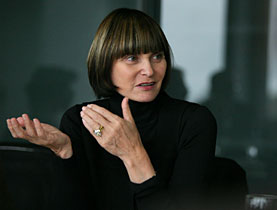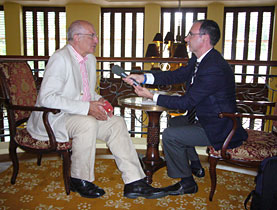Finding a “rightful place” for human rights

The Swiss government on Friday said it would launch a project to study global human rights over the last six decades and to make recommendations for the future.
Foreign Minister Micheline Calmy-Rey announced the Agenda for Human Rights in Geneva as part of celebrations for the 60th anniversary of the United Nations Universal Declaration of Human Rights.
The panel will comprise eight experts including former UN rights commissioner Mary Robinson as well as an expert from Geneva University.
The programme identifies key issues that have arisen since 1948, the year the seminal document was drawn up, including challenges relating to human dignity, migration, health care and human rights.
Calmy-Rey said the agenda “takes stock of the progress already made, but especially to set clear objectives and discover new avenues to explore in order to return human rights to their rightful place in the 21st century”.
National action
“The idea is to work at the national level, more than internationally,” said Andrew Clapham, the initiative’s coordinator and head of the Geneva Academy of International Humanitarian Law and Human Rights at Geneva University.
“Rather than new international treaties, it is a question of applying these rights in countries and creating national protection systems, by using the existing legal framework based on the Declaration of Human Rights and its laws that form the covenant of civil and political rights, as well as economic, social and cultural rights,” he told swissinfo.
The themes, such as the billion in the world people living in extreme poverty, matter to all countries, the agenda’s authors say.
“To fight poverty, the poor must have access to justice,” said Clapham. “If a poor person is deprived of his home, the case can theoretically go to court. But if he cannot afford a lawyer, litigation is virtually impossible. The aim is therefore to identify strategies to facilitate access to justice.”
Missing piece
Another aspect raised by the panellists was the recognition of shared responsibility between governments and other influential actors.
“Traditionally, human rights discourse placed responsibility on the state,” Clapham said. “But other actors can be made responsible, such as rebel groups, an international organisation or a transnational corporation. The idea is that legislation on human rights can involve these players and not just the states.”
He described the lack of a world court of human rights as the “missing piece in the architecture of human rights”, and hence its inclusion in the agenda.
“The idea of this court goes back 40 years. At the time, we imagined three protective institutions: the International Criminal Court, the High Commissioner for Human Rights and a world court of human rights. “
The first two institutions were established in 2002 and 1993 respectively. A profile for the world court still needs to be defined and two research projects are presently charged with developing models for such an institution by May 2009, Clapham added.
Single agenda
The agenda project was initiated last year by Switzerland and will continue to produce proposals applicable to the international and national level in the coming years.
The country has appointed a special envoy for human rights, Ambassador Rudolf Knoblauch, to coordinate a diplomatic offensive to encourage the agenda to be taken up by states and at the UN.
Depending on the issue, work will be carried out on a bilateral or multilateral level. The next step will be presenting the agenda at the UN headquarters in New York.
A dozen states are already interested in the project, and it has been backed financially by Austria and Norway. Its cost has so far remained under SFr1 million ($820,000).
“It is possible that other countries are launching similar initiatives. But in the end a single agenda should remain for all countries and Switzerland should play a major role in it,” concluded Clapham.
swissinfo, based on an article in French by Frédéric Burnand in Geneva
“The dignity of millions of people continues to be violated as a result of weak or ineffective governance, corruption, poverty, oppression and war.”
“The attacks on the dignity and rights of our fellow humans are the shame of the entire humankind.”
“It is enough to mention the mistreatment of detainees, the chronic lack of access to adequate food, basic health care and decent work, the violations against civilian populations in times of conflict, human trafficking, the deplorable conditions of migrants and the state-less and violence against children.”
Foreign Minister Micheline Calmy-Rey launched the Agenda for Human Rights at a ceremony in Geneva on Friday. Present were members of the panel, the president of the UN Human Rights Council and local representatives.
The agenda is a Swiss initiative and forms part of the 60th anniversary celebrations of the Universal Declaration of Human Rights.
It was prepared by a panel of eight human rights experts, including Mary Robinson, the former UN High Commissioner for Human Rights, UN Special Rapporteur on Terror Manfred Nowak, Brazilian human rights expert Paulo Sérgio Pinheiro and Hina Jilani, co-founder of the Pakistan Commission on Human Rights.
It identifies eight specific areas for further study by research institutes on different continents.
These are: human dignity, prevention, detention, migration, statelessness, the right to health, climate change and human rights, and a world court of human rights.

In compliance with the JTI standards
More: SWI swissinfo.ch certified by the Journalism Trust Initiative











You can find an overview of ongoing debates with our journalists here . Please join us!
If you want to start a conversation about a topic raised in this article or want to report factual errors, email us at english@swissinfo.ch.